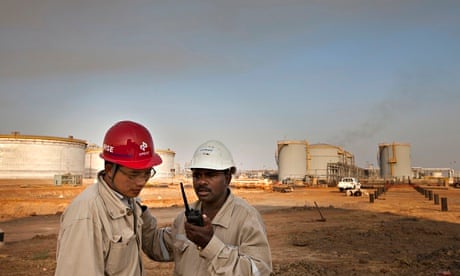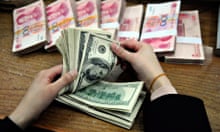China's foreign ministry has condemned the behaviour of some Chinese citizens in Africa following its ambassador to Tanzania giving an uncommonly frank newspaper interview in which he decried the "bad habits" of his compatriots.
In the interview, Lu Xinsheng said Chinese businessmen smuggle ivory and rhino horns out of the country and flood local markets with counterfeit goods while contractors constantly try to undercut each other, resulting in shoddy infrastructure projects. "Our bad habits have followed us," he told the Guangzhou-based Southern Metropolis News.
A foreign ministry spokesman, Hong Lei, said it condemned such behaviour. "The unlawful behaviour of a small number of Chinese people in Tanzania and other African countries has harmed China's image, and had a negative impact on friendly Sino-African and Sino-Tanzanian relations."
Hong continued: "We should point out, these problems are not mainstream in Sino-African cooperation, and also cannot eclipse the achievements of Sino-African cooperation."
While Chinese officials once balked at describing the China-Africa relationship as anything but a "win-win", they have recently become more open about problems there. In May, the Chinese premier, Li Keqiang, referred to disputes over investment projects in Africa as "growing pains".
China has given Africa billions of dollars in aid and investment in recent years, peppering the continent with Chinese-built roads, stadiums and hospitals. Yet the burgeoning relationship has also been a magnet for controversy. Critics say that Beijing is only interested in Africa as a potential wellspring of mineral resources, and that its projects there often benefit governments more than local people.
China is Tanzania's largest trading partner, with about 500 Chinese companies operating in the country by the end of 2013. When the Chinese president, Xi Jinping, visited Tanzania as his first stop on a tour of the continent in March 2013, he called China and Tanzania "all-weather good friends".
Yet Lu's assessment of Chinese traders and contractors in the country paints a more nuanced picture. "In Tanzania, there are probably 70 foreign ambassadors. Not one embassy is like ours, worrying every day about issues of consular protection," he said. "Also, there isn't one country with citizens like ours, who endlessly complain about being treated unfairly."
He said that many citizens complain about being profiled for baggage checks at airport customs lines, ostensibly as a check against smuggling.
"Every time Tanzania says it will arrest someone for smuggling ivory, we immediately get nervous," he said.
Lu recalled a conversation he'd had with the governor of Dar es Salaam province, in which the governor recalled witnessing police hassling a Chinese driver in the middle of a street.
"The governor said that treating Chinese people like that is too unfriendly, and went to reprimand the police officers," Lu said. "But the officers said that a more senior official had obtained reports that the car contained elephant tusks."
While the Chinese driver vehemently denied carrying wildlife contraband, police searched the car anyway, and ultimately retrieved a bundle of tusks from beneath its hood. "This made the governor never want to speak up for Chinese people again," Lu said.
Lu added that Chinese contractors had even caused tensions within the Tanzanian government while fighting to acquire lucrative contracts. In 2012, two Chinese companies seeking local government support "wore out" the minister and vice-minister of the country's transportation ministry. "To compete for projects, they caused a power struggle between the minister and vice-minister, and as a result, the president fired them both," Lu said.






Comments (…)
Sign in or create your Guardian account to join the discussion